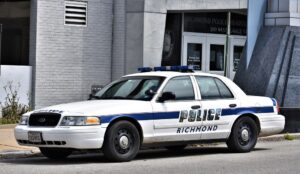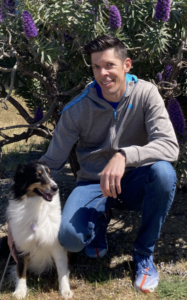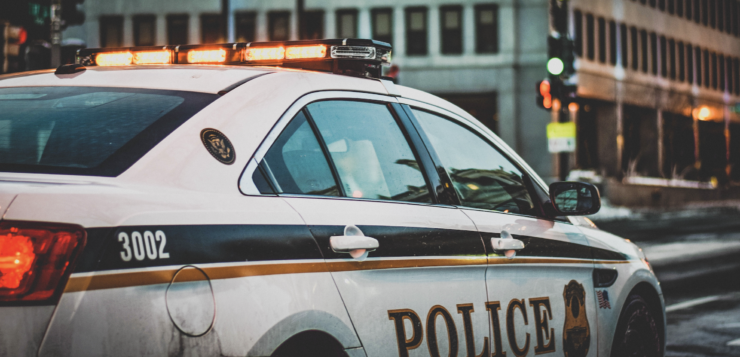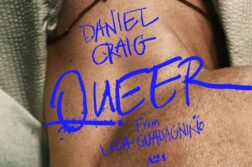
I received an email from headquarters on a Friday afternoon in early June. It was an email similar to others at the beginning of each month, where they acknowledge the significance of everything celebrated that particular month, with a deep dive into the history of it. This email notated the beginning of Pride, and spoke to the significance of Sally Ride’s accomplishments and contributions as an astronaut, while she hid her true identity as a lesbian. It was the first time I remembered the head of an agency, and a law enforcement agency nonetheless, had not only acknowledged Pride month, but put effort into it.
It encouraged me reflect on my journey and career, as I am now in my twentieth year as a law enforcement officer. It’s hard to believe how far things have come since I began my career in 2003, as Deputy Sheriff in a conservative suburb of Richmond, Virginia. Back then, I was deeply closeted, dating women, and terrified of who I really was. There wasn’t one gay officer among the ranks, or at least one who was out. Working in such a hyper-masculine career field, for an agency where the Sheriff could fire you for any reason, added to the anxiety and fear of revealing who I was. Survival was paramount, and I was just “one of the boys,” so I put my head down and did the best job I could.
I maintained a double life the entire time I worked there, from December 2003 to December 2009, which was also the year I married my husband. One person at the agency knew I was gay and married, as she was my closest peer and even attended our (very quick) wedding in the Boston Public Garden. When I left the Sheriff’s Office for the U.S. Secret Service soon after, I felt immense joy, optimism, and hopefulness that I could be my true self and have more protection and benefits for myself and my husband.
I was wrong. After keeping my secret from my classmates through the two academies, I landed in Miami as a new Special Agent, and quickly felt something was amiss. A couple of months later, I was sent to the Miami International Airport squad, away from the main office with another 120 agents to work protective assignments and remain out of sight. I was on a three-year, 120-day probationary period and dared not say anything about my sexuality, for fear of being fired if I spoke up about the discrimination. The hyper-masculine, anti-gay law enforcement environment prevailed in my new role.
I did what I had done for years: kept my head down, worked hard, took on as many duties as possible, hoping that my work proved I was worthy of the title and career path I chose. Around that same time, a supervisor in the main Miami Field Office saw my work ethic following a large counterfeit seizure and arrest at the Miami International Airport, and asked if I wanted to join his squad. I jumped at the opportunity, and was soon back with my peers; I began to flourish under his leadership, regardless of my sexuality, which, unbeknownst to me, had spread around the office by that time. He took a chance on me, and I worked hard to ensure it was a worthwhile risk.
In 2013, after nearly three and a half years, I finished my probationary period as a Special Agent. I was in a briefing when my iPhone alerted me to the breaking news that SCOTUS had overturned the Defense of Marriage Act (DOMA), which meant my husband and I could legally get married. I could hardly contain my jubilation as I frantically texted my husband. He was now entitled to have the same benefits that were denied to us for years, the same benefits that all of my colleagues had long enjoyed. I was filled with hope and optimism; things were finally beginning to change.
Monday of the next week, I called HR and asked how to enroll my husband in health, dental, and vision insurance. They were caught off guard and said they didn’t have a policy in place, and couldn’t offer guidance on how to handle it. As it turned out, I was the first gay agent to ask for these benefits, and the first gay agent to require relocation benefits; we had to wait while those details were ironed out. This began my process of coming out at work and slowly revealing my true self to my team. I felt empowered and emboldened to finally break that façade I’d spent so many years building.
By 2015, we relocated to Washington, D.C., seeking more protections for our marriage, when SCOTUS handed us an even greater win with the Obergefell v Hodges case; our marriage was now legal in all fifty states. The streets of D.C. came alive as we all flooded toward the White House, bars, and Dupont Circle. The energy was palpable and exuberant. I finally felt equal to my peers, six years after we had left our home state for our discreet wedding in Boston.
Fast forward to today, I now lead a team of amazing and diverse Special Agents on the West Coast; I am honored to lead this team and proudly be myself. Since my memoir, Breaking Free, A Saga of Self-Discovery by a Gay Secret Service Agent, came out in March, I regularly receive messages from others who walked a similar path, or had similar experiences. It is truly humbling, but also shows we have more work to do in law enforcement, to achieve equality and take a stand against the renewed attacks on the LGBTQ community.
But also, nobody on my team knows about my book. I have an underlying fear that there will be retribution for sharing intimate details of my life and my journey. The book is candid, shedding light on things that some prefer to remain hidden, and the culture in my profession isn’t known for being very open-minded. Will my book stymie a potential future promotion, create gossip, or make people uncomfortable or view me differently? I’m not sure, but it is a risk I eventually have to take. Members of the LGBTQ community deal with more than their share of shame, both internally and externally, and it is an ongoing part of our struggle. I have more work to do, and working through my own fears is part of my evolution, as an individual and a leader.
Thinking back to the email I had received from headquarters all those years ago, I now felt it was my duty to send a message to everyone in the region as one of the supervisors, to share my personal perspective about the importance of Pride month. It was a first for me, to openly disclose some of my struggles as a member of the LGBTQ community and its implications on my career, to my colleagues. I wanted to convey it not only for relatability purposes, but also as a nod to my agency and how fortunate we all are, to work where we do and the progress we’ve made. Hopefully, by humanizing the message and revealing some vulnerability, it will inspire others to always be their true selves, to be better allies, and to know that hate has no place here. We have one path to take, and it is forward.
 Cory Allen grew up in rural western Pennsylvania before a divorce moved the family to a conservative suburb of Richmond, Virginia. He ended up in the U.S. Air Force, which led to a career in local law enforcement. In 2019 at the pinnacle of his career, he left the Secret Service and everything he knew on the east coast to restart his life in California and begin the process of finally being his own person. Cory continues to work in law enforcement, now leading the next generation of Special Agents, and he resides in California with his partner, where they are plotting their way into parenthood.
Cory Allen grew up in rural western Pennsylvania before a divorce moved the family to a conservative suburb of Richmond, Virginia. He ended up in the U.S. Air Force, which led to a career in local law enforcement. In 2019 at the pinnacle of his career, he left the Secret Service and everything he knew on the east coast to restart his life in California and begin the process of finally being his own person. Cory continues to work in law enforcement, now leading the next generation of Special Agents, and he resides in California with his partner, where they are plotting their way into parenthood.






